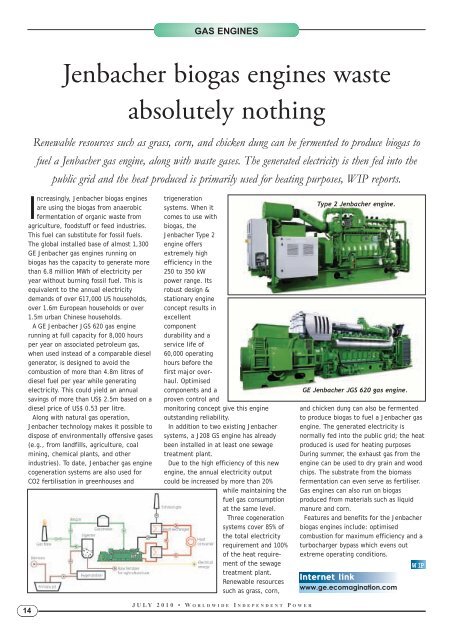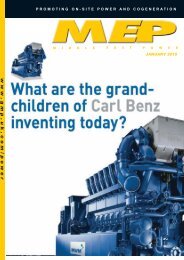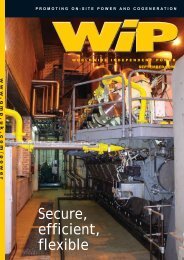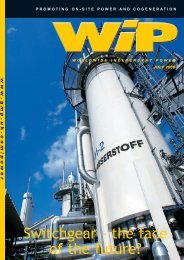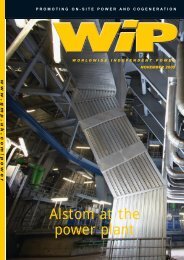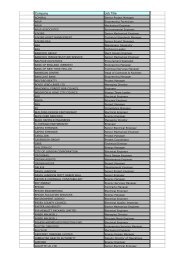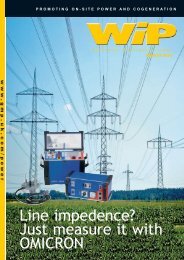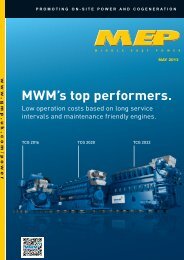DIRANA technology from OMICRON - Global Media Publishing Ltd ...
DIRANA technology from OMICRON - Global Media Publishing Ltd ...
DIRANA technology from OMICRON - Global Media Publishing Ltd ...
Create successful ePaper yourself
Turn your PDF publications into a flip-book with our unique Google optimized e-Paper software.
14<br />
GAS ENGINES<br />
Jenbacher biogas engines waste<br />
Increasingly, Jenbacher biogas engines<br />
are using the biogas <strong>from</strong> anaerobic<br />
fermentation of organic waste <strong>from</strong><br />
agriculture, foodstuff or feed industries.<br />
This fuel can substitute for fossil fuels.<br />
The global installed base of almost 1,300<br />
GE Jenbacher gas engines running on<br />
biogas has the capacity to generate more<br />
than 6.8 million MWh of electricity per<br />
year without burning fossil fuel. This is<br />
equivalent to the annual electricity<br />
demands of over 617,000 US households,<br />
over 1.6m European households or over<br />
1.5m urban Chinese households.<br />
A GE Jenbacher JGS 620 gas engine<br />
running at full capacity for 8,000 hours<br />
per year on associated petroleum gas,<br />
when used instead of a comparable diesel<br />
generator, is designed to avoid the<br />
combustion of more than 4.8m litres of<br />
diesel fuel per year while generating<br />
electricity. This could yield an annual<br />
savings of more than US$ 2.5m based on a<br />
diesel price of US$ 0.53 per litre.<br />
Along with natural gas operation,<br />
Jenbacher <strong>technology</strong> makes it possible to<br />
dispose of environmentally offensive gases<br />
(e.g., <strong>from</strong> landfills, agriculture, coal<br />
mining, chemical plants, and other<br />
industries). To date, Jenbacher gas engine<br />
cogeneration systems are also used for<br />
CO2 fertilisation in greenhouses and<br />
absolutely nothing<br />
Renewable resources such as grass, corn, and chicken dung can be fermented to produce biogas to<br />
fuel a Jenbacher gas engine, along with waste gases. The generated electricity is then fed into the<br />
public grid and the heat produced is primarily used for heating purposes, WIP reports.<br />
trigeneration<br />
systems. When it<br />
comes to use with<br />
biogas, the<br />
Jenbacher Type 2<br />
engine offers<br />
extremely high<br />
efficiency in the<br />
250 to 350 kW<br />
power range. Its<br />
robust design &<br />
stationary engine<br />
concept results in<br />
excellent<br />
component<br />
durability and a<br />
service life of<br />
60,000 operating<br />
hours before the<br />
first major overhaul.<br />
Optimised<br />
components and a<br />
proven control and<br />
monitoring concept give this engine<br />
outstanding reliability.<br />
In addition to two existing Jenbacher<br />
systems, a J208 GS engine has already<br />
been installed in at least one sewage<br />
treatment plant.<br />
Due to the high efficiency of this new<br />
engine, the annual electricity output<br />
could be increased by more than 20%<br />
while maintaining the<br />
fuel gas consumption<br />
at the same level.<br />
Three cogeneration<br />
systems cover 85% of<br />
the total electricity<br />
requirement and 100%<br />
of the heat requirement<br />
of the sewage<br />
treatment plant.<br />
Renewable resources<br />
such as grass, corn,<br />
JULY 2010 • WORLDWIDE I NDEPENDENT P OWER<br />
Type 2 Jenbacher engine.<br />
GE Jenbacher JGS 620 gas engine.<br />
and chicken dung can also be fermented<br />
to produce biogas to fuel a Jenbacher gas<br />
engine. The generated electricity is<br />
normally fed into the public grid; the heat<br />
produced is used for heating purposes<br />
During summer, the exhaust gas <strong>from</strong> the<br />
engine can be used to dry grain and wood<br />
chips. The substrate <strong>from</strong> the biomass<br />
fermentation can even serve as fertiliser.<br />
Gas engines can also run on biogas<br />
produced <strong>from</strong> materials such as liquid<br />
manure and corn.<br />
Features and benefits for the Jenbacher<br />
biogas engines include: optimised<br />
combustion for maximum efficiency and a<br />
turbocharger bypass which evens out<br />
extreme operating conditions.<br />
Internet link<br />
www.ge.ecomagination.com<br />
WIP


